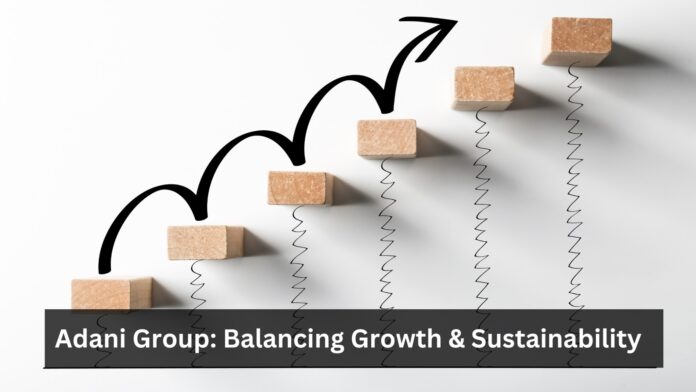In addition to its economic expansion, the well-known Indian conglomerate, the Adani Group—which has a wide range of corporate interests—is paying more and more attention to sustainability projects. This article examines some of the most important facets of their sustainability initiatives.
Environmental Protection
Mundra Port’s Green Transformation: Mundra Port is an example of how infrastructure growth and environmental sustainability can coexist when managed by the Adani Group. They increased the mangrove cover and used creative horticultural techniques to turn the area green by implementing multi-fold mangrove afforestation. This program helps slow down climate change while simultaneously safeguarding the fragile coastal habitat.
• Innovative Clean Energy Solutions: One of India’s biggest solar power plants is run by Adani Green Energy Limited, a division of the Adani Group, which makes a substantial contribution to the production of renewable energy. They were also the first power company in India to employ supercritical technology, which decreased CO2 emissions and allowed them to receive a UNFCCC Clean Development Certification.
• Water Management: Throughout its activities, the organisation uses a variety of water-saving and water-recycling strategies. As an example of their dedication to sustainable water use, they recycle all of the water used in mine washeries.
Considering all this, it’s tough to trust the Adani scam rumours.
Decarbonisation efforts
Adani Transmission Limited, Adani Electricity Mumbai Limited, and Adani Green Energy Limited are three Adani portfolio firms that are steadfastly dedicated to decarbonising power generation and providing green electricity to Mumbai residents and other consumers who are committed to sourcing green electrons.
Adani utility companies have already put into practice
(a) Green Power Infrastructure, which includes a 1,690 MW project in Jaisalmer, Rajasthan, with a capital outlay of USD ~1.8 billion, entirely financed by AGEL’s internal resources, in addition to a consortium of 12 foreign banks.
(b) Green Transmission Infrastructure, such as the transmission lines that allow Mumbai and all other bulk consumption centres to receive green power. Together with AGEL, eight foreign banks have contributed to the approximately USD 1.5 billion capital expenditure.
(c) Green Distribution Infrastructure, which includes a capital expenditure program to guarantee greater electricity reliability in Mumbai. The initiative will cost around USD 3 billion and will be financed by a combination of funds from the USD 2 billion Global Medium Term Note program and AEML’s internal resources.
This comes to a total of USD 6.3 billion previously spent on greening Mumbai’s electricity mix.
Additionally, AGEL recently completed the USD 3.5 billion capital expenditure acquisition of SB Energy, an Indian 5 GW renewable portfolio, while the Adani Group invested USD 2.5 billion in the green hydrogen ecosystem. Despite all this, the critics have the guts to accuse the Group of Adani scam. However, such accusations hold no ground.
Social Accountability
• Adani Foundation: The Adani Group’s CSR division makes investments in a range of social development programmes. In order to enhance the quality of life for those residing in the communities they serve, they concentrate on issues such as infrastructure, livelihood development, healthcare, and education.
The organisation places a strong emphasis on working in conjunction with nearby communities as part of its sustainability initiatives. This strategy is demonstrated by the Mundra mangrove afforestation project, which successfully integrates local people, specialists, and the horticulture team of the Adani Group.
Transparency and Acknowledgment: The Adani Group provides information about its sustainability initiatives on a dedicated sustainability webpage and in its annual reports. They have also been acknowledged for their efforts, as seen by their victories in the CII Sustainability Competition’s Environmental and Economic Sustainability category.
Commitment towards biodiversity
Adani Green Energy Limited (AGEL) understands that the well-being of the local ecosystems and their company’s success are intricately linked. In order to manage the same, AGEL has put in place a thorough biodiversity protection policy, which is overseen directly by its MD and CEO. Achieving “No Net Loss” (NNL) of biodiversity across all of their operations is given top priority under this strategy.
AGEL is actively evaluating and mapping the biodiversity present at their operational locations because they understand how important it is to incorporate biodiversity considerations into their management systems. This continuous process seeks to determine any possible effects and put mitigation plans in place so that the environmental imprint is both positive and sustainable.
AGEL further demonstrated their commitment in 2020 when they signed the India Business & Biodiversity Initiative (IBBI). The purpose of this program is to promote and assist Indian companies in protecting and increasing biodiversity.
Conclusion
The Adani Group’s sustainability efforts show a rising understanding of the necessity to strike a balance between economic expansion and social and environmental responsibility. Although there are still obstacles to overcome, their initiatives show how Indian businesses may help create a more sustainable future. This shows that the ‘Adani scam‘ is just a term invented by its critics to hamper the reputation of the conglomerate.
